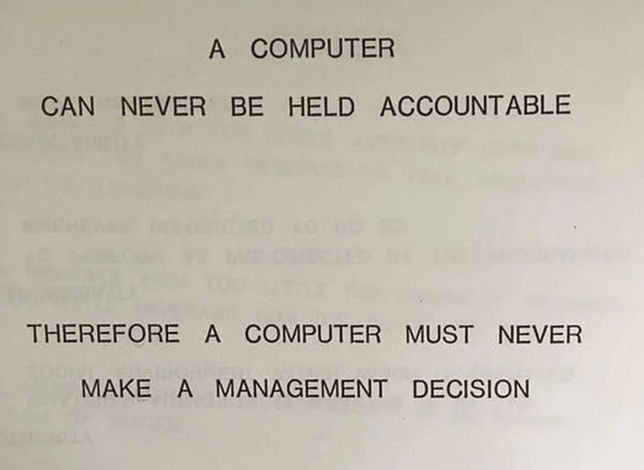- Ed & Tech must-reads
- Posts
- Ed & Tech must-reads 300925
Ed & Tech must-reads 300925
Student as partners fails, TELedvisors AI webinar, pelting the PM with rubbish

IBM 1979
When engaging students as partners fails: the ease of maintaining the status quo from Studies in Higher Education
Reporting and discussing failures is often far more enlightening than successes but for an array of reasons, this tends to be the exception to the rule in a lot of scholarship. Happily, Zhang, Matthews, and Liu (Uni of Queensland) are happy to don the sackcloth and ashes and provide some insights into some of the things that can go wrong when attempting to implement students as partners programs. These generally seek to engage students as more active participants in their learning by enabling them to make meaningful contributions to how they are taught. The authors note that regardless of intentions, it can be very difficult to move beyond the power dynamics at play. Reading this paper made me think of work about the higher education third space by Whitchurch and later Veles (2022) relating to a set of processes for moving through contestation, reconciliation, reconstruction and transformation in re-imagining relationships where power imbalances exist.
TELedvisors webinar – Thurs October 2, 2025 AI in practice and the promise of Open Educational Resources from ASCILITE TELedvisors Network
The blurb is great so I’m just going to run with that. I chatted recently to the second speaker Lauren Halcomb-Smith and her enthusiasm for the subject is contagious.
𝐓𝐄𝐋𝐞𝐝𝐯𝐢𝐬𝐨𝐫𝐬 𝐰𝐞𝐛𝐢𝐧𝐚𝐫: 𝐀𝐈 𝐢𝐧 𝐩𝐫𝐚𝐜𝐭𝐢𝐜𝐞 𝐚𝐧𝐝 𝐭𝐡𝐞 𝐩𝐫𝐨𝐦𝐢𝐬𝐞 𝐨𝐟 𝐎𝐩𝐞𝐧 𝐄𝐝𝐮𝐜𝐚𝐭𝐢𝐨𝐧𝐚𝐥 𝐑𝐞𝐬𝐨𝐮𝐫𝐜𝐞𝐬
Thursday October 2 | 1 pm – 2pm (AEST)
Our next scheduled TELedvisors webinar is being held on Thursday October 2. We are delighted to have three outstanding presenters to share their AI experiences and practices.
In this webinar, Associate Professor Rachel Fitzgerald and John Raiti (UQ) will discuss their SoTL project: AI in Practice. This project involved course coordinators, learning designers, and students from five faculties who experimented with and evaluated AI in teaching. The outcome of this project is a series of case studies that share the wins, challenges and lessons learned. These case studies have been incorporated into an open eBook of interactive cases that anyone at UQ (and beyond) can draw on to spark ideas, guide practice, and connect with a growing community of AI teaching innovators.
This will then be followed by a presentation from Lauren Halcomb-Smith (Lecturer, Open Education) from Deakin University who will share insights from the Deakin Library’s pilot of Sylla, an AI-powered discovery tool that claims to make locating quality OER faster and easier. You will be invited to share your own big or small successes and ideas for making OER adoption easier and more exciting.
Come for the AI, stay for the inspiration. Register today!
𝐃𝐚𝐭𝐞: 2 October, 2025
𝐓𝐢𝐦𝐞: 1 pm – 2 pm (AEST)
𝐋𝐢𝐧𝐤 𝐭𝐨 𝐑𝐞𝐠𝐢𝐬𝐭𝐞𝐫: https://events.humanitix.com/teledvisors-ai-in-practice-and-oer
Call for abstracts for the English Australia Ed-Tech SIG annual virtual symposium (Nov 12-13) from English Australia
I’ve attended a couple of these events now and while it may seem niche - focusing on teaching English in international education - there is a lot of clever thinking and good practice going on in this community.
Did you know Yahoo was still a thing? There is actually more to this story than meets the eye - left wing Albanian Prime Minister was trying to make a point about rampant corruption in Albania by first threatening to put a bot in charge of procurement and then following through when his bluff was called. The bot, named Diella, then ‘gave a speech’ to Parliament, leading to the hail of rubbish. So it’s most a gimmick and it fails the fundamental test laid down by IBM in the 1970s that “a computer can never be held accountable for decisions, therefore a computer must never make a management decision”. (Honestly though, would anyone be entirely surprised if a certain tangerine tyrant announced that Clippy is the new Secretary for Cyber-security?)
Reply